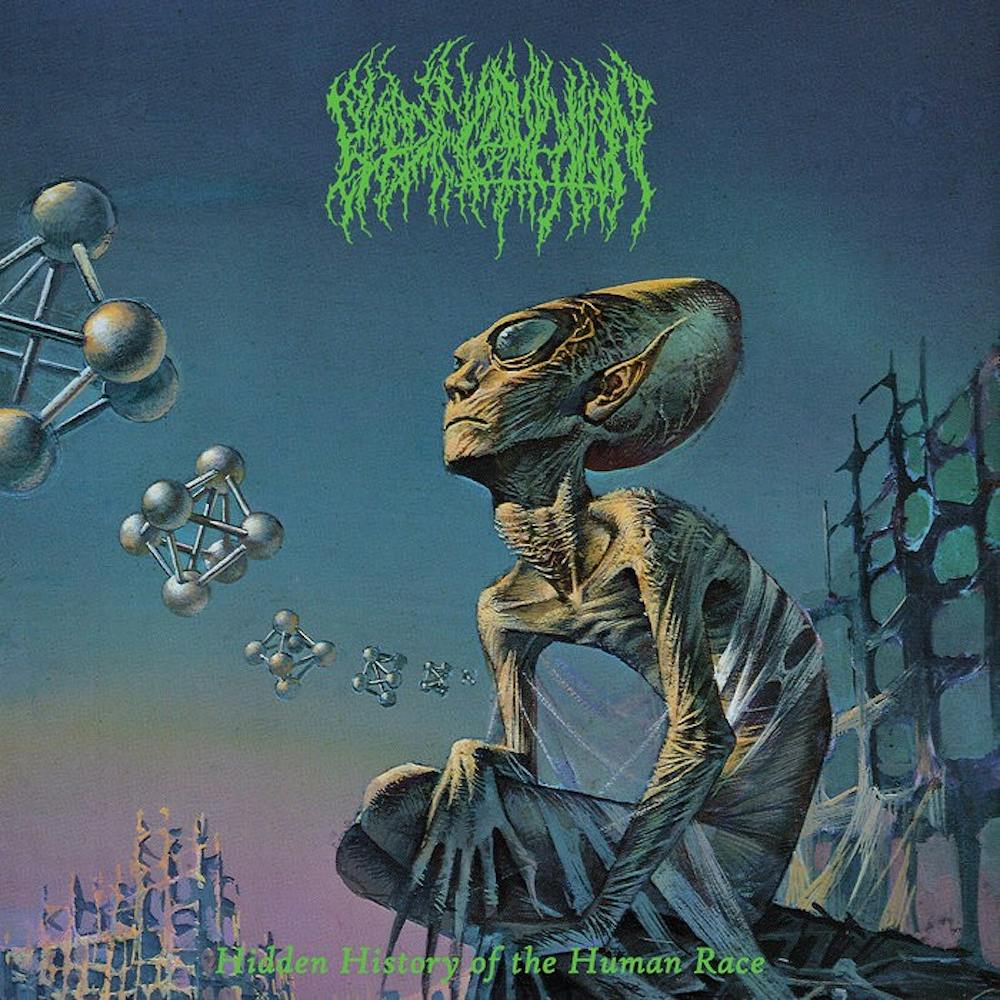Death metal reigned supreme in Mohawk Place Wednesday while growls, grunts and brutal riffs pulverized the audience.
Denver’s Blood Incantation, one of the more innovative modern metal bands, has effortlessly blended psychedelic jams, progressive song structures and punishing riffs since its formation in 2011. The extreme metal quartet is breaking into the mainstream, earning Pitchfork’s Best New Track on Oct. 11 for “Inner Paths (To Outer Space).”
Blood Incantation has explored and expanded upon their signature dense and atmospheric sound over the last eight years, and its new album, “Hidden History of the Human Race” releases on Nov. 22 via Dark Descent Records.
Before the band took the stage at Buffalo’s Mohawk Place last Wednesday, members discussed their tour with Immolation, the benefits of psychedelic drugs and the upcoming album.
The interview, lightly edited for style and length, follows below:
The Spectrum: What has it been like sharing the stage with death metal legend Immolation on this tour?
Isaac Faulk (drums): Sharing the stage is awesome. I would say that they’re one of the originators of the genre and definitely in the vein of the death metal that we like. Obviously, being on the road with a band that you look up to is awesome, right? I think both bands kind of teach each other things and it has been awesome. Just hearing stories from them about going to Europe and the early ‘90s and stuff, playing with crazy bands like Nihilist. It’s been great.
TS: Your psychedelic take on death metal has become increasingly grand and spacey with each release. Has this gradual shift been a conscious decision or has the music grown naturally?
F: Yeah, it was always kind of the idea to have some of those elements in there. But I think we’ve just gotten better at it.
Paul Reidl (guitar/vocals): Every song basically has gotten crazier. If you were to list them all in chronological order, they each can be expanded upon previously established things in each song.
Morris Kolontyrsky (guitar): We’re getting better at integrating those parts into how we write.
TS: Who are some of the artists who influence your music?
F: Pink Floyd, King Crimson, Gong, Kitaro, Camel, Gorguts, Opeth.
K: Other than the obvious ones like Timeghoul and Demilich.
F: Newer bands too, like Defeated Sanity are a big inspiration for us. Their EP “Dharmata,” we heard that and we were like, “Wait, what? We have to up our game sufficiently.” So that was a big one. But honestly, a lot of times, it’ll be like one riff from a band’s entire discography will be inspirational. It’s such a cool idea that sometimes a whole section or idea of a song will come from just that riff.
TS: You’ve mentioned that your new single “Inner Paths” was largely improvised using psychedelics. Could you talk a bit about that experience and how the song came about?
F: It kind of just evolved from our jams at practices. We would often just hang out for a few hours at the practice space, drink mate, smoke weed and talk about conspiracies. Chill for a couple hours and then we jam for a little while and then we’ll actually work on something.
R: You’ve got to get the s----y stuff out of your system so you don't have a bad riff slip into your stream of consciousness.
K: We were getting into some stuff, laughing around and talking about all sorts of stuff. And the only song we played was “Inner Paths.”
TS: “Inner Paths” has more emphasis on atmosphere than it does on brutality. Can listeners expect this theme throughout the new album, “Hidden History of the Human Race?”
R: Yeah, it was on purpose to make people be like “F--k this.” But then the album comes out and every song is simultaneously more brutal and more atmospheric.
TS: For those who have never heard Blood Incantation before, what should they know before listening to this new record?
R: Open your mind, dude. Stop trying to be something and experience something how you want it to be. Just let it be how it is.
K: Quit filming.
F: Yeah, don’t Snapchat yourself listening to the record.
TS: Why the decision to use a fretless bass? Is there any particular advantage over using a traditional bass? This, as far as I know, is pretty unconventional, especially for death metal.
Jeff Barrett (bass): I joined the band essentially filling in place for a guy who had played fretless on a previous session. I did want a fretless so I was just open to exploring the different uses of not having frets. It is pretty alien sounding in its tone. You can bend notes a lot more and slide into sections. … It’s very unconventional and we’re an unconventional band.
TS: If each one of you could sum up the new record in one word, what would it be?
R: Sick.
F: Epic.
B: *Exhales*
K: Gargantuan.
The arts desk can be reached at arts@ubspectrum.com.





